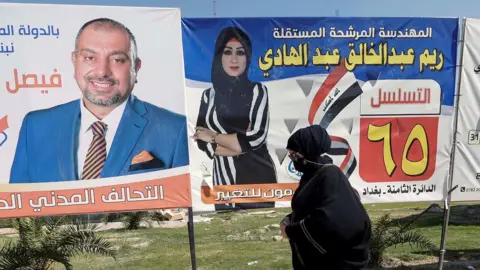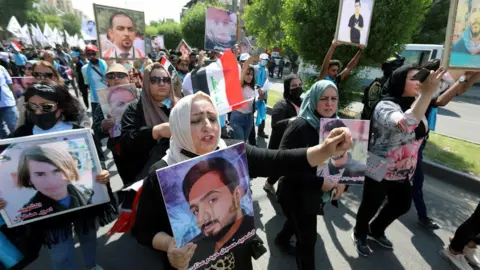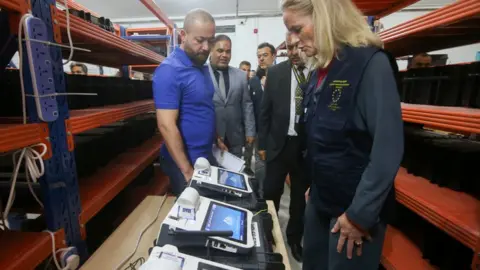Iraqis vote in first parliamentary election since 2019 mass protests
 Reuters
ReutersIraqis have voted in the first parliamentary election since mass protests over corruption, unemployment and poor services erupted in 2019.
The poll had been due next year but was brought forward by six months in response to the unrest, during which hundreds of people were killed.
The old electoral system based on party lists has also been replaced with one meant to help independent candidates.
However, the main Shia Muslim blocs are still predicted to win the most seats.
They have dominated parliament since the US-led invasion in 2003, which overthrew Saddam Hussein's regime and ushered in a power-sharing system based on sectarian and ethnic identity that allowed a narrow elite to keep a firm grip on power and encouraged patronage and corruption.
Turnout was reportedly low in Sunday's vote. The electoral commission head told AFP news agency hours before the polls closed at 1800 local time (15:00 GMT) that it was estimated at just over 30%.
The 2019 protests saw hundreds of thousands of mostly young people take to the streets of the capital, Baghdad, and cities in the predominantly Shia south to express their anger at the poor economic and living conditions endured by most Iraqis despite the country's enormous oil resources.
Then-Prime Minister Adel Abdul Mahdi's government resigned within weeks, but the protesters kept going and insisted that they wanted to sweep away the entire political establishment.
More than 550 protesters were killed by security forces and gunmen suspected of links to Iran-backed Shia militias within the paramilitary Popular Mobilisation force between October and December 2019. The unrest subsided because of restrictions imposed to counter the spread of Covid-19.
Former intelligence chief Mustafa al-Kadhimi promised to find solutions to Iraq's crises when he became prime minister in May 2020, but he has failed to address the protesters' main grievances.
 EPA
EPAHe has also been unable to prevent gunmen continuing to target critics of the government and Iranian influence in Iraq. At least 35 protest leaders, activists, journalists, lawyers and other civil society members have been killed and 80 others wounded in an apparent assassination campaign.
Mr Kadhimi has, however, kept his promise to hold an early election.
The new electoral system replaces one in which each of Iraq's 18 provinces was designated as a single constituency and parties allocated seats to candidates according to their share of the vote. Now, there are 83 constituencies and three to five candidates who win the most votes in each one will go to parliament.
The aim is to make it easier for local independents to challenge established parties, but analysts say the latter still have big advantages in terms of resources and media access.
The main contest is expected to be between the two largest blocs in the outgoing parliament - the nationalist Saeroun alliance of populist Shia cleric Moqtada al-Sadr, who wants to end Iranian and other foreign influence in Iraq, and the pro-Iranian Fatah alliance, mainly made up of parties affiliated with Shia militias in the Popular Mobilisation.
 Reuters
ReutersA quarter of the 329 seats in the new parliament are reserved for women.
The UN, US and European powers have echoed the words of Iraq's most revered Shia cleric Grand Ayatollah Ali al-Sistani, who urged the 25 million eligible voters to participate in the election because it was the "safest way to cross the country into a future that is hoped to be better than the past".
However, some of the activists involved in the protest movement have called for a boycott, citing the failure to bring those responsible for the deaths of demonstrators to justice.
